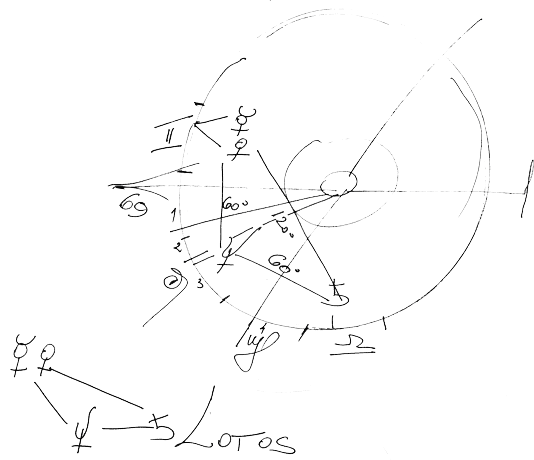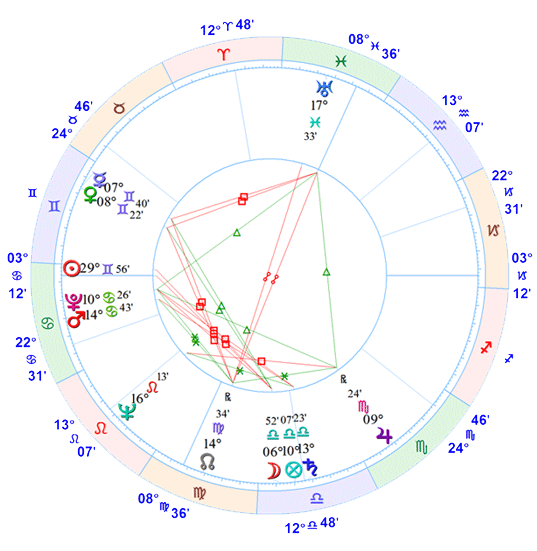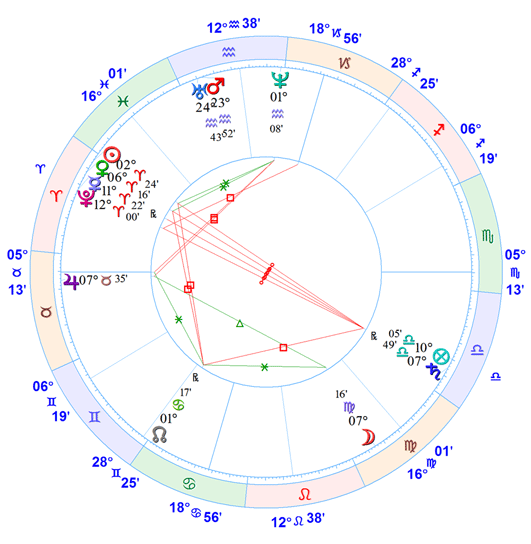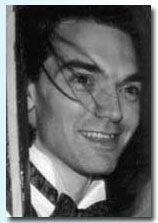
|
The Secret Blend of Astrology and Film
Copyright © All Rights Reserved by Aleksandar Imsiragic INTRODUCTIONAstrology is certainly a divine language, as the symbols it uses are universal and all-pervading, describing every corner of the Universe and events within It. Astrology gives answers to questions we raise and, most importantly, it describes the laws by which all things come into existence. Once you know this language, which is the law, you gradually come to know that you are able to see through the apparent phenomenal forms and reach the underlying intelligence at the basis of everything. Astrology enables you to be in contact with that knowledge and the events which are seemingly invisible. You can literally watch a new, huge Universe unfold in front of you, something of which most people are simply not aware. SYMBOLISM IN THE HOROSCOPE OF AN ASTROLOGERIn the horoscope of an astrologer, astrological symbolism is represented by Uranus (the main indicator of symbols or language through which astrology sees). In the case of my horoscope, Uranus is in the third house (the way of thinking) and in addition it is sextile Neptune in the fifth house. As the fifth house represents love, entertainment and art in general, Neptune positioned here speaks about love (the fifth house) of film (Neptune), and its sextile with Uranus (astrology) in the third house (the way of thinking). This combination reflects the ability to enjoy the translation of events unfolding in film into astrological symbols. The most fascinating thing is that when I use one aspect to describe an event in the film, then all the other events connected with those planets start to fit perfectly in the whole story, as if it was a real life situation and not the creation of the director, completely conceived by a human mind. THE WRITING TABLE: A FILMThe film takes place in the present time. At the beginning of the movie, the leading actor comes across an antiquity shop while walking with his girlfriend. In the shop, he discovers an old writing table from the 19th century. The writing table strongly attracts his attention and he decides to buy it. For some reason, the table is so fascinating to him, he even wakes up in the middle of the night and starts polishing it. While arranging the table, he discovers a secret compartment and several love letters in it, written long ago and not read by anyone until now. He reads them and understands that they were written by a girl to whom the writing table belonged 150 years ago. She was writing them to an imagined lover, giving him her heart, and grieving over a marriage in the near future to a man she does not love, but whom her father thinks to be appropriate for her... At this point I began to create a picture of planetary aspects necessary in the life of a man who came in touch with the writing table containing secret love letters. Of course, it is logical to suppose Venus (love) to be in conjunction with Mercury (letters), especially so in the twelfth house (secrets), but in a sign which could indicate a table. The sign could be Virgo (office table), Libra (flat table or lady's table) but also Gemini, which represent the tables of all kinds. In this particular case, Gemini would strongly emphasize letters and communication. I still can't decide between conjunction of Venus and Mercury in Virgo or Gemini... The next scene solves the dilemma: Scott (the name of the young man in the movie) visits his mother the next day and tells her what he had found in the table. He does not tell it to his girlfriend, but only to his mother. Interesting! His mother is youthful and cheerful. She is learning foreign languages. From their conversation we find out her origin is Italian... She tells him, by the way, that instead of having a big wedding, he could spend the money for a trip around the world with his fiancée Deborah. "But I do not want to travel around the world", he says. This sentence removes the last doubt: he is certainly a Cancer Ascendant, as this statement shows typical Cancerian need for home and lack of desire to travel (Cancer - home, house, family...). His confession to his mother (Cancer) only strengthens this concept. This confirms my hypothesis that his twelfth house is Gemini, with Venus (love) and Mercury (letters) in conjunction. "Of course", I conclude, "Mercury and Venus in the 12th house are secret, hidden letters, which are in the table (Gemini), and furthermore in the compartment of the table (Gemini additionally represents compartments). The letters had been left there long ago, from an age that has passed (Gemini should be intercepted: that is, the cusp of the twelfth house should begin in Taurus, so that no house begins in Gemini). That means the Ascendant should be in the beginning of Cancer so that Gemini could be intercepted at the latitude where he was born (Boston, Massachusetts because the action of the movie is unfolding there). "In that case", I calculate quickly in my mind, "the fourth house should begin somewhere in Virgo, which would also represent his mother, and the ruler of that house would be Mercury, which we already know is placed in the twelfth in conjunction with the Venus. Yes, of course. His mother is of an Italian origin (the ruler of the fourth house, representing the mother, is Mercury, positioned in Gemini (and the larger part of Italy is ruled by Gemini). Mercury (that is, the ruler of mother in this case) is conjunct Venus (he tells her about the love letters), and she herself likes traveling (Mercury in Gemini with Venus). This is why she suggests an idea to him about how to organize his wedding traveling (Mercury conjunct Venus).""No doubt - that is it!" I infer with certainty now, with the feeling every painter has when he makes his first steady strokes of the picture. TIMELESS COMMUNICATION:"Why don't you try to answer her letters", said the mother in a cheerful voice. "I think it would be great, if it worked out!" Only a mother represented by such a merry combination of planets (Mercury conjunct Venus in Gemini) could suggest such an odd thing to do (the planets are in the twelfth house of slightly odd ideas). In the next scene, she gets him some old stamps and old ink, so that he can use this particular ink to write the letter and send it with the stamps that were used in those times. Stamps are ruled by Mercury, but old stamps should be connected with a Saturn somehow. I reject the possibility of Saturn being in conjunction with Mercury and Venus, because this would indicate that Scott is depressed, and the mother would not be that cheerful either. In addition, the ink she gets for him indicates that Mercury must be connected with Neptune, so this gives me two new elements which should be introduced into the whole picture. I think to myself, if he really plans to answer her, then Neptune must be in the third house (unusual ideas), sextiling the conjunction in the twelfth house, and Saturn can be only in the fifth, trining Mercury and Venus, and also sextiling Neptune in the third (Saturn in the third house would not inspire him to do this "weird thing", but Neptune would). Therefore, old ink (Neptune sextile Saturn) and old stamps (Mercury trine Saturn) have introduced two new players on the scene who must perfectly fit with all other events. Saturn in the fifth trining Mercury and Venus tells us about the antique shop (Saturn) in which he found the table (Mercury) and old love letters (Mercury and Venus trining Saturn that itself is in the fifth house of love). In order to find out the address to which he should send the letters, he calls the antique shop owner (Saturn) and asks him for the address from where the table had been obtained (Mercury trine Saturn), and of course he gets it (trine). In addition, his mother suggests he should send the letters from the only post office in town that was built before the civil war and which is placed at the outskirts of the city. She tells him to send the letters by night (Mercury in the 12th). "I don't know why, but I think it is better that way!" she explains. The old post office again corresponds to the symbolism of Mercury and Saturn. I don't yet realize the significance of the "just before the civil war" part of the equation, so I leave that for later. So far, I have the following outline in my mind, confirmed through a number of details:  REAL PERSON FROM 1923Hmm... If the conjunction of Mercury and Venus is in Gemini, then Neptune should be in Leo, and Saturn should be in the middle of Libra in the fifth house ("old" love, fiance). "Has there been any such a combination in the past?" went through my mind as I was watching the film. I stopped the VCR and opened the ephemeris, resolved to find out if there was some correspondence. I knew that Neptune was in Leo somewhere around the Twenties of last century. I was not completely sure about Saturn, but after some searching I found that in 1923, Saturn was in Libra, Neptune in Leo, and in the month of June, Mercury and Venus were conjunct in Gemini. Incredible! It has surpassed anything I could expect! The combination I thought of to describe the action in the movie turned out to be real, and not just the fiction of a director. Excited, I looked at the position of other planets. It struck me immediately that the Sun was at 29° of Gemini on June 22, 1923."Of course, the Sun is at 29° and also in the twelfth house, — I thought. It really indicates openness towards "paranormal" events. This degree gives pronounced intuition, spirituality, even clairvoyance. On the material level it usually indictes loss through the symbolism of the planet positioned there. In this case, it is the Sun, which could indicate a loss of a father. Because the father is never mentioned throughout the film, it is not difficult to guess that the lead character indeed does not have a father (Sun in the 12th, at the 29°). I am calculating a horoscope of a person supposedly born in Boston, the place where the action in the movie takes place, so that Ascendant would fall at early Cancer degrees and Gemini would be intercepted in the twelfth house. After some calculation, I got the time of 4 hours and 27 minutes, which produces an Ascendant of 3° Cancer (where there is a fixed star Tejat, which itself has the nature of Venus and Mercury). This degree really gives a tendency for living in the past. The ruler of the Ascendant, the Moon, is at 6° Libra, a degree which regularly brings unusual events in life. It is sometimes called a degree of life and death.  Apart from being at 29°, the Sun is also on the fixed star Menkalinan, a dangerous star belonging to constellation of Auriga, the Coachman. "The Sun at this degree of Gemini could represent a post office", I deduce, above all because the post office is an institution (Sun), it is at the outskirts of the city (29°), and it was built just before the civil war (29° of Gemini, just one degree from the sign of Cancer where we find a Pluto/Mars conjunction, describing a civil war very strongly). In the next scene our hero writes a letter with the pen and ink, goes by night to the post office that was built before the civil war, and drops the letter in the mail box. And while I was still thinking about the position of the Sun on the fixed star Menkalinan from the constellation of Coachman, a scene appears on the screen showing a postman driving a coach (!) and delivering a letter to our heroine who lived some 150 years ago. Is it really possible for symbolism to get through to such deep levels? The post office and the postman, who does not go by foot, but by a coach, are represented by the star belonging to the constellation of the Coachman! Because I know that the star is dangerous and indicates calamity, I suspected that an accident would happen with the Sun on the 29°. Besides, the Sun is a ruler of Scott's third house, and therefore in the twelfth it has to speak of "unusual communication" and all possible paranormal experiences. His third house can also represent a post office, so the Sun (as the ruler of 3rd) at 29° of Gemini tells about a "timeless" post-office, but on the objective level it brings a real danger (29° is a sign of loss on the objective plane). We'll see as the film unfolds... Elisabeth Witcomb is the name of a girl who lived in 1863. She wrote letters and some poetry. Although romantic, she is a very determined girl and of quite liberal outlook for the age in which she lives. The postman delivers her a letter, she opens it and, of course she almost faints away! She got an answer to letters she wrote to her completely abstract and secret lover. She finds out from the letter that he does not live in her times, but almost 150 years later. After the first shock, she decides to answer and puts the letter in the secret compartment of her table (which is his in the modern age). In the next scene he is equally surprised by finding her new letter in the same secret compartment of the table. Thus begins their communication that breaks the time barrier through the table and a post office built before the civil war. The action unfolds simultaneously in the movie. In the present day, our hero Scott is gradually falling in love with the woman who lived long ago. I the past, Elisabeth Witcomb is completely in love with her secret non-existent lover, and she also writes poems. She is courted by her suitor, Mr. Rigl, who is a much older, conservative gentleman and art reviewer by profession (just try to imagine how a conservative critic would look in those times!). During their correspondence, Elisabeth and Scott even exchange photographs - Scott sends his own in color, and she sends him one of the erliest photographic plates. Of course, Neptune sextile Mercury must indicate a photograph (Neptune) sent via letter (Mercury), additional proof of validity of this aspect. On another note, Scott likes cycling. In one scene while cycling though woods, he comes across an obstacle, falls down and loses consciousness. The significator of the bicycle is primarily Uranus because cycling requires the ability to maintain balance. In addition, we can use Mercury and also the third house. The woods are represented by the twelfth house and also by the sign of Pisces and the planet Neptune. Scott has this energy in the form of Uranus in Pisces (driving bicycle through the woods) quincunx Neptune in the third house, which indicates the obstacle and the loss of consciousness (Neptune). There is Mercury in the twelfth, as noted earlier, which once again describes cycling through the woods. He is brought to the hospital, where he spends about ten days in coma, and his fiancée is beside his bed the entire time (Venus in the twelfth) talking to him (in conjunction with Mercury) although he is in coma (twelfth house). In the meantime, while he lies in the hospital unconscious, Elisabeth Witcomb, a hundred and fifty years away, meets a military officer incredibly similar to Scott. She falls passionately in love with him. She writes to Scott about this, but for several days she does not get an answer, because he is in the coma. She mentions the name of the officer in the letter and explains to Scott that through this officer she feels closer to him than ever. The civil war in America is going on and her officer is to go to battle soon. THE SUN AT 29° OF GEMINI:After about ten days, Scott recovers and, through the letters she sent to him, learns about recent developments. He is very happy about her meeting the officer, but he worries about the officer's fate in the war. Searching the historical data about the civil war on Internet, he discovers that her lover dies in just the battle he is about to go to. He quickly writes to Elisabeth, asking her to stop her officer from going to the battle, and he goes to the post-office to send the letter. However, as he is approaching the post-office he sees the building in flames. With difficulty he gets through the back entrance to send the letter as he has done so many times before. He manages to send it at the last minute, and the letter gets to Elisabeth through the postman in the coach.<. It is now clear to me about the danger associated with the Sun conjunct Menkalinan at 29° of Gemini. The post-office, which was their bridge through eternity (29°), burned down. Elisabeth received her last letter from Scott. The officer had already left to the battle, so she collected all of her strength to try to reach him, in order to save him. Explosions, gunfire, wounded soldiers and dead ones were all part of the scenes she saw as she looked for her lover. When she finally found him, he had been already heavily wounded, and he then died in her arms. At this very moment, Scott is telling to his fiancée Deborah about his "love affair" with Elisabeth, letting her know that what he feels for Elisabeth he will never feel for her (Deborah), whom he is to marry. Of course, the romance breaks down. Saturn, which is in his fifth house trining Venus, is naturally a strong sign for a long romance and fiancée, but the square of Mars to Saturn indicates breaks. "I HAVE NEVER FORGOTTEN"In the next scene, Scott leaves for Elisabeth's old house, which still exists in the woods out of the town (his Venus/Mercury in 12th). He discovers there that she never married, and that she has been remembered as quite unusual person for the age in which she lived. She wrote poems and worked as a professor in the school. He finds out where she was buried and goes to visit her grave. The cemetery represented by the eighth house. The ruler of the eighth is Saturn and it is in the fifth house, in a trine with Mercury and Venus, as discussed previously. Can you guess what happens to him at the cemetery? First he finds a love message on the tomb-stone of the beloved one (Saturn the ruler of the eight, also signifying stone, is in the fifth... in trine with Venus and Mercury) saying: "I have never forgotten." This is indicative of Mercury trine Saturn with the Moon trining Mercury, which tells us about memory. Of course, it had to be a line of that kind. However, because Saturn (ruler of the 8th) is in the fifth, he finds his love in the cemetery! Just at that very moment, a girl walking with her dog appears (Saturn is in trine with Venus (girl) and Mercury (a pet). The girl, incredibly, looks just like Elisabeth Witcomb, though she looks more modern. They recognize each other at first sight, and the movie ends. THE HOROSCOPE OF ELIZABETH WITCOMB:While our hero was looking at the message written on the tomb-stone, I noticed the date of birth, which is usually inscribed on the stone. It read Elisabeth Witcomb, 23. March 1834. Although the time of birth was not inscribed, I decided to make a horoscope for that day at noon in Boston. As I already knew some events connected to her life, it was not very difficult to determine the exact time of birth by rectification. I found out that she was born at 7.20 a.m. This time places Jupiter, the ruler of the 9, in the first house (she was a professor). The rulers of the 7th were Mars and Pluto. With Mars in Aquarius conjunct Uranus, what can better indicate that she lived freely, unmarried? Pluto is in the 12th house, suggesting the lack of a partner, or a partner from another time. Besides, the Moon is in Virgo, which often indicates widows and spinsters. She wrote poems (conjunction of Mercury and Venus) of which Mr. Rigl, the art critic, spoke as being too full of passion (Mercury and Venus in Aries) and too revolutionary for her time (Mars, the dispositor of Mercury and Venus, is in Aquarius in conjunct Uranus). This critic of her poems is Saturn in Libra (an elderly man criticizing, and at the same time offering her a marriage, again Libra). Saturn opposes Mercury (criticizing), but also opposes Venus, so she remains unmarried (more so as Venus is in the 12th). Where in the chart do we see her correspondence with "the man from other times"? Of course it comes from the same picture we can see in the horoscope of our main hero: Mercury conjunct Venus in the 12th, intercepted in Aries.  The ruler of the third house is Mercury (writing), and it conjuncts Venus (love) in the twelfth (secret, out of time). The conjunction of Mercury and Pluto reflects the fact that her letters have found "time holes" and traveled to a completely different age. It also reflects the fact that she learned from Scott's letter that her officer might die in the upcoming battle (Mercury conjunct with Pluto, news of death). The officer she loved and his calamity can be seen from the fifth house (pre-marriage love affairs). Leo on the cusp of the house suggests a striking, handsome man. The Sun, ruler of the fifth, is in her twelfth, which is the eighth house (war, death) from the fifth (lover). I conclude that he is an officer because the Sun is in Aries in the eighth house from the fifth (officer going to war). She loves him (Sun conjunct Venus), but he dies (eight house from the fifth, which speaks of difficulties for loved one). Venus also opposes Saturn; Mars, the dispositor of Venus, is conjunct Uranus (explosion). He dies in her arms (Venus, her signifier, and the Sun, his signifier, are conjunct in his eighth house!). Does the chart say why she does not arrive in time to save him? This we see from the next picture: when she got the news that her beloved one will die (Mercury in conjunction with Pluto), she (Venus) quickly (Aries) runs to the battlefield (Venus is moving toward conjunctions with Mercury and Pluto (where people die). Before Venus reaches this conjunction, however, she receives the exact opposition of Saturn (Venus is at 6°, and Saturn is on 7°, so Venus enters the opposition). The opposition suggests an obstacle, which tells us she will arrive late. On another level, the situation certainly relates to history (Saturn) too, which rebels against the change of the course of events and especially of those historically recorded (that the officer had died in the battle). CONFIRMATION THROUGH PREDICTIONS:Now comes the best part: completely fascinated by the incredible intelligence underlying every story (however fictional it may appear), I decided to check the thing through predictions. On the basis of a date written at the heading of her first letter which Scott found in the table (16-04-1863) it is clear she was 29 when she wrote it, and that date marked the beginning of incredible events in her life. According to directions, her Moon at her 29 years of age (one year = one degree) comes to 6 degrees of Libra, and that is the degree where our hero has his Moon. This is so real, I simply could not believe it! Also, her Venus from the twelfth house moved to conjunct her Ascendant (a further confirmation of the exactness of the Ascendant), which indicates a strong love (secret, out of time, because Venus is in the 12th in the intercepted sign) unfolding in that particular year. On the other hand, her Jupiter, according to the very same direction, is in the exact sextile with Venus (the greatest love). Yet, in that year a person she loves (the officer) dies, and this is clearly seen from the position of the directed Sun. In her 29th year, the Sun has moved to 1° of Taurus. The Sun is the natural ruler of the fifth house (her lover) and by direction is in exact square with Neptune, the ruler of the eighth house from the fifth (the ruler of death of her lover). Although it is not my desire to do a comparative analysis of their horoscopes, I cannot avoid noting that their Parts of Fortune are absolutely on the same degree: Elisabeth's is at 10° 05' Libra, and Scott's is at 10° 07' Libra. By the way, this is the degree of the star Kaphir, which has a Mercury-Venus nature. Does this combination remind you of something? I should also mention that a horoscope made for the date of her first letter (April 16, 1863) gives Moon/Neptune conjunction in her twelfth house at 4 degrees of Aries, which is in the exact midpoint between her Sun and Venus in the twelfth. Everything matches everything else to the minutest detail, as if the event really happened. CONCLUSION:CONTACT WITH THE SPIRIT I am completely convinced that the whole atmosphere is full of intelligent beings (some would call them spirits), who are in constant contact with us below the threshold of our conscious existence. Every story an artist tells about the moment of inspiration while creating a work of art includes a story of some spirit or some intelligence "conveying" it to him or her. This is true of every artistic work. I know that I spontaneously translate every film and every situation I encounter into the language of astrological symbols. I do this because astrology is my way of thinking (Uranus in the 3rd house). Yet, this is the first time I made full horoscopes for both of the main characters in a movie, the first time I became so strongly interested in the characters and the plot. And why is it so? Again I look at the horoscope of Scott, the main hero. It dawns to me as I look at the chart that he has Uranus (the planet of the astrologer) at 17° Pisces, in the very degree of my Sun, my Ascendant ruler! I am profoundly connected to his story, and it has been given to me to see it quite clearly. In the horoscope of Elisabeth Witcomb, I find Uranus at 24° Aquarius, in the exact degree Uranus occupies in the present time when I am exploring the film characters with astrological tools. Both horoscopes are connected with Uranus via my own horoscope and via the very moment of their discovery.
|

 AUTHOR:
AUTHOR: 